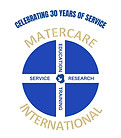Official Statement: MaterCare International Response to Proposed U.S. IVF Expansion as an “Essential Health Benefit”
- MaterCare International

- May 30, 2025
- 3 min read

Official Statement: MaterCare International Response to Proposed U.S. IVF Expansion as an “Essential Health Benefit”
May 30, 2025
MaterCare International expresses deep solidarity with the many couples who suffer the pain of infertility. This anguish touches the very heart of what it means to love and long for family. As physicians, caregivers, and people of faith, we recognize and honor this suffering with sincere compassion.
Recent reports suggest that the United States government is considering measures to classify in vitro fertilization (IVF) as an “essential health benefit,” thereby expanding insurance coverage, including potentially under military and federal employee plans. While this may appear to be a compassionate gesture toward couples longing for children, it raises significant ethical concerns that must be addressed, particularly for people of faith and conscience.
As a Catholic medical organization committed to the dignity of human life from conception to natural death, we are deeply troubled by the total acceptance and subsidization of IVF. The process of IVF bypasses the natural reproductive system and avoids treating the underlying causes of infertility. Thus, even when IVF achieves a child, the couple’s infertility problem persists and remains potentially reliant on future IVF. Furthermore, male factor infertility treated by intracytoplasmic sperm injection (ICSI), may also be transmitted to male children, and thus become transgenerational.
IVF typically creates multiple human embryos with enormous and deliberate wastage from several factors: intentional discarding as a quality control measure (embryo selection), embryo death from freezing and thawing associated with embryo storage (cryopreservation), the planned overproduction of embryos to increase pregnancy rates, and because of preimplantation genetic diagnosis or prenatal testing and abortion. There are additional ethical issues associated with embryo storage and selection including embryo marketing, donation, experimentation, preimplantation testing and destruction. Whilst natural cycle IVF with fresh embryo transfer avoids some of these ethical issues, the use of donor gametes and surrogacy in some practices further distorts the unitive and procreative dimensions of marriage. Sadly, most IVF embryos are never implanted and many are destroyed, frozen indefinitely, or used for experimentation.
Such procedures do not merely sidestep moral teaching, they violate the inherent dignity of human life. Each embryo is a human being, deserving of protection and love, not a surplus commodity in the pursuit of parenthood. Compassion must never come at the cost of justice, particularly toward the most vulnerable.
Considering these developments, MaterCare International calls upon policymakers, medical professionals, and the wider public to consider the ethical alternative of restorative reproductive medicine (RRM), in which the underlying causes of infertility are identified and treated thereby restoring reproductive and general health in the married couple. This enables conception to occur naturally (physiologically) as a direct result of the unitive act.
Restorative treatments, which include Prof. Thomas Hilgers’ Natural Procreative Technology (NaProTechnology) and Prof. Pilar Vigil’s Fertility Education and Medical Management (FEMM), have numerous advantages over IVF. They can be at least as effective in achieving pregnancy, but without the high costs and ethical dilemmas associated with the handling of gametes and embryos. And, whilst most IVF-conceived children are healthy, IVF conception has been associated with a higher prevalence of adverse obstetric, perinatal and long-term health outcomes, including congenital anomalies, compared with pregnancies conceived naturally. The association appears stronger for IVF with intracytoplasmic sperm injection, especially for fetal anomaly, for singleton and multiple pregnancy.
In summary, innovations such as NaProTechnology, which work with the natural fertility cycle of the couple, have shown promise in addressing the root causes of infertility without compromising moral principles. These approaches offer real hope to couples, restoring fertility, not bypassing it, and respecting both the integrity of marriage and the sanctity of every human life. Therefore, we strongly encourage the US government to classify Restorative Reproductive Medicine and the evidence-based approaches of NaProTechnology and FEMM in particular, as an “essential health benefit.”
We urge those crafting public policy to respect the diversity of moral perspectives in this pluralistic society, and to preserve the rights of religious healthcare providers and pro-life citizens to conscientiously object to participation in or funding of embryo-destructive procedures.
True progress lies in solutions that unite science with ethics, and compassion with truth. MaterCare International will continue to support and advocate for life-affirming care for mothers, fathers, and children born and unborn.
Main references:
Šeman EI, Mathieson EM, Villa UP, Little DT, Juanta RDLR, Corby P, Fleming JI, Purcell B. An Evaluation of Controversial Statements in Etica Teologica Della Vita. Linacre Quarterly. 2024 Nov;91(4):403-420. DOI: 10.1177/00243639241245316
CONTACT:
MaterCare International (Canada)
257-C LeMarchant Road
St. John’s, NL
A1E 1P8
Telephone: (709) 579 - 6472
Toll Free: (888) 579 - 6472
Fax: (709) 579 - 6501
Email: info@matercare.org




Comments